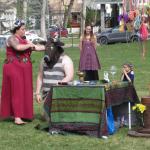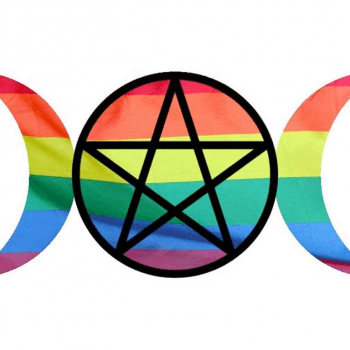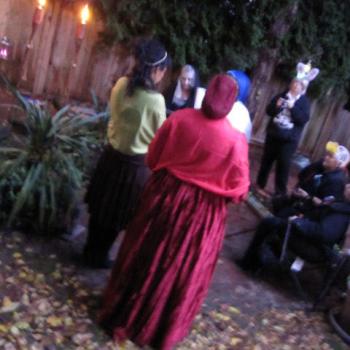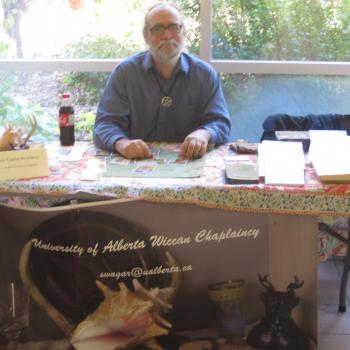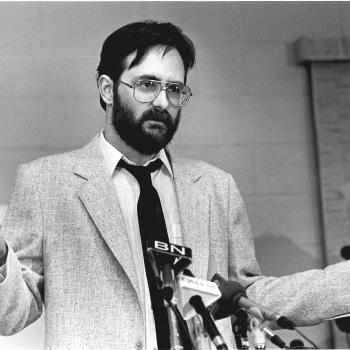“Ritual is a means of performing the way things ought to be in conscious tension to the way things are in such a way that this ritualized perfection is recollected in the ordinary, uncontrolled, course of things.” – Jonathan Z. Smith
An Introduction
One of the things that distinguishes Wicca is our emphasis on ritual and experience. Why think about doing ritual? Why not just do it? We could begin with Socrates and say that “the unexamined life is not worth living” but that is really too abstract. We want and need a theory of ritual so that the ritual that we do can serve our purposes as individuals and members of society more effectively.

Most of the time, in most of life, we are only partly conscious of what we are doing, rarely of why or the greater purposes, and so we follow established habits, do things by rote. However, this means we do not choose what we do; we follow patterns set down before us, not to serve our purposes and our needs. And, naturally, when we are seeking to do a thing without thinking about it, we will follow a format that we are familiar with, often from childhood. In the case of ritual, there are established patterns of what is said and how, the kinds of movement and song, the roles and expectations of the leaders and participants in the rituals, and each of us carries a set of these patterns around with us, which we pull out to use.
However, there are ideas about the divine, relationships between humans and the rest of the world, about social relationships, that are encoded in these ritual elements. We may find ourselves, when we think about what we have been doing and saying, deeply disagreeing with rituals we have done, or using several contradictory ideas in a single ritual, in the absence of a theory to organize everything. There is no such thing as “instinct” in humans and when we “go with the gut” we are not more authentic, simply thinking less about what we are doing, reacting from an older layer of practices. A person raised as a Pentecostal will unthinkingly do Pentecostal-style ritual, a Buddhist act as a Buddhist and so on. This is a particular problem for Pagans, mostly converts, but even for people remaining in their tradition of birth. Unless we understand what we are doing, what functions ritual has and what we wish to accomplish with it, we will repeat, not create. And, because each system of ritual, and each theory about ritual, emphasizes some things and ignores others, we might find ourselves unable to ritually speak about things that are very important because we lack the language or a theory of ritual that enables us to create a language to suit our needs.
Whence theory: structures of ideas not about the here and now how-to questions but the why and the meaning and purpose questions. I take as my starting place Catherine Bell’s observation that ritual’s main immediate product is experienced ritualists. If this is true then, considering the large amount of time and energy involved and the importance placed on ritual in every society and throughout time, experienced ritualists must produce something very important for society, not just for themselves. Ritual must also be an important social activity as well, not simply a matter of individual psychology and personal satisfaction. Ritual is a large and complicated subject and so I’ll be breaking into down into sections and looking at different parts of it in separate posts over the next little while. I won’t try to deal with every kind of ritual or even every part of a simple ritual. I will try to identify important parts and look at them.
Ritual is, above all else, something that we do. It is experienced not in the abstract or in discussion but principally in its performance. To learn about ritual, please go out and do it, preferably in a wide range of situations, and with an open mind and spirit and a flexible body.
Ritual creates meaning. It simplifies reality and finds those parts of it that the ritualist thinks are the most important rather than trying to be all of reality. Reality is messy and incomplete and our understanding is often clouded. Ritual can make things clear and give us a deeper insight into this messiness. Ritual both separates us from the messiness of reality and brings us a deeper and closer approach to what is the most significant. We can temporarily erase the distinctions between people and no longer be women or men, old or young, gay or straight, or persons of one skin colour or another – we can ritually be at one.
And even more profoundly, we can no longer be merely human but can find ourselves, temporarily, as part of the All. After doing ritual we can come from this profound deep identification back to day-to-day reality, to find it transformed, to find reminders of the sacred wholeness in that day-to-day activity. We can accomplish practical tasks in ritual ways; bring people together to cooperate with each other, to come to understand what we need to do to accomplish our goals.
Ritual can help us step through the doors of different stages of our lives, from birth, through growing up and becoming adults, through marriage and the birth of our own children, to old age and finally to death and whatever might lie beyond the veil. Ritual gives us clear steps and new meanings appropriate to these different stages of our lives. And we can go, knowing that our ancestors have gone these ways before us, can stay attached to our families, communities, and our people while growing ourselves as individuals. Through ritual our accomplishments and growth are part of others’, and we are supported in our accomplishments.
Ritual helps us to change, but to change without losing our connection to our past and to those that have been before us. Transformation and tradition, and at least the broad outlines of where we go in life is set out in the structure of the ritual – we may not know what woman we will be but when we do a coming of age ritual (which can be done for transwomen as well) we know we will become a woman and in broad outlines what a woman is. Ritual gives us power.
Ritual takes away power by bringing the powerful to the same level as the powerless, and by distributing resources more evenly, based on the fundamental equality of all ritual participants. Ritual gives all of us a connection to the great, shared, power that all are part of – so by becoming humble we become part of this greater thing. We can ask and receive help, give with more strength and less fear than in other times and places. We can participate in something that moves us deeply.

Ritual is power, it is art, it is a kind of problem solving, a form of therapy, of theatre and a means of making our wishes and dreams real, it gives us pleasure in itself by sweeping us into dance or song, it is meaningful in itself but it also creates meaning that we can take into the rest of our lives, it is a kind of magic, a meditation, a kind of work. It is a social activity, a part of culture although it sets itself aside for a period of time to explore social facts that may or may not later be expressed directly in daily life.
Ritual is as complex as the issues of personal and social identity, meaning, meaning making and pleasure. Who I am is one who does ritual, but ritual also creates me as I do it. By deciding what ritual I do, I decide what deep motives and attachments I will create for myself and what things I will consciously set in motion in my life. So, my hope is that this discussion will give tools, and understanding, to assist us all in doing this ritual process more effectively, in deciding what we want to change, how we wish to be changed, and to powerfully and effectively work with this tool in our lives and communities.
Reality is messy and complicated and the meaningful aspects of life are frequently obscured by a lot of other details of day-to-day life. Things don’t always turn out how we planned, people make mistakes, the weather doesn’t cooperate, everything costs more money than we thought and we don’t often win the lottery. But we can clear away the clutter and get closer to the essence of things through ritual. We do it not because we can achieve perfect harmony, but because we can have a goal to aim toward, a vision of what underlies all of these difficulties, of a world in harmony and balance.
By living in this perfect world for a little while we get a sanctuary away from the daily demands, but even more importantly, a place to focus our attention on particular parts of our lives. With all of our energy and attention aimed at these elements, we can go deeper and further toward accomplishing our goals and finding lasting meaning. And we can hope to bring those feelings and experiences from the rituals back into our regular lives again.
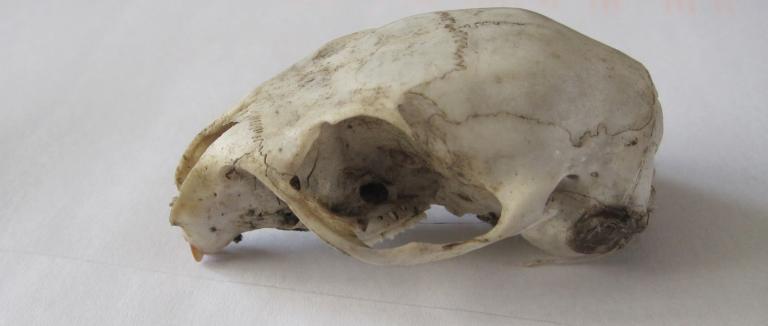
We don’t do ritual just to do ritual, but to get to that deeper connection and understanding and to connect back behind appearances to the eternal design revealed, in a cloudy light, through our daily lives. We can change reality, for a minute, and then come back to the cloudy and ambiguous real world with insight and tools with which to change it.
In this series I am talking both about what I think and how I practice. Skills of ritual performance develop principally by doing ritual but the ability to make and perform effective ritual also is determined by how well someone understands what they are doing and why, as they prepare to select the means, the how of it. I don’t want to write just a ritual cookbook because there are enough of them around already and without a theoretical base and some idea of why and how things fit together we can’t get beyond the cookbook stage of things. After a while, a good cook makes up her own recipes and a competent ritualist will create effective ritual using whatever materials are at hand.
Next week “Ritual is a Way of Making Meaning”


